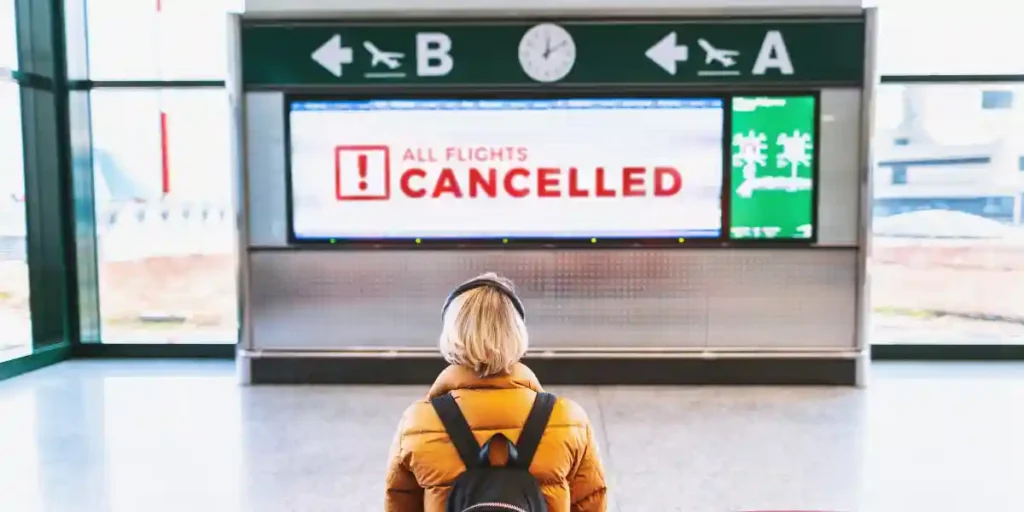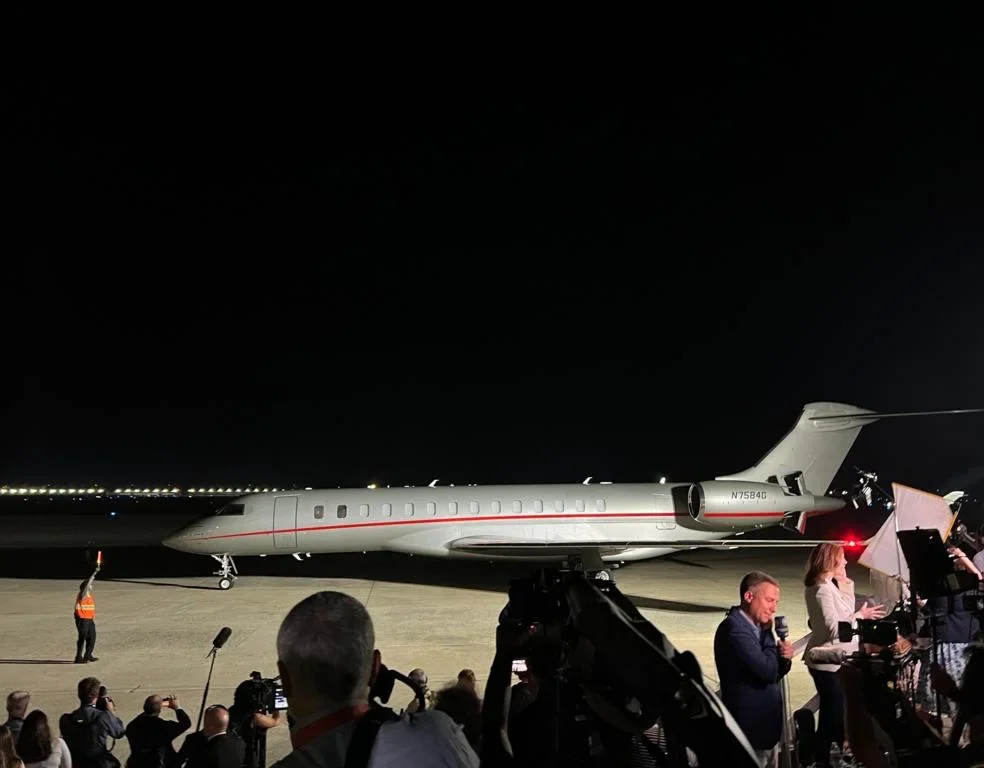Middle East Flight Cancellations Disrupt Irish Travel

Recent US airstrikes on Iranian nuclear sites have heightened geopolitical tensions and resulted in the Middle East Flight cancellations. This created immense inconvenience for passengers around the globe, particularly Irish holidaymakers. Several Irish passengers were stranded in Dubai when the Heathrow to Dubai flight was cancelled.
Meanwhile, Ireland’s Department of Foreign Affairs (DFA) has issued new travel warnings for the region. Due to the conflict, some airlines have had no option but to suspend or alter service routes. This directly impacts Irish travellers. Let’s summarise the critical aspects that every Irish traveller should be aware of regarding recent Middle East flight cancellations.
Conflict Behind Middle East Flight Cancellations
The Middle East flight cancellations stemmed from the escalating conflicts following a recent US bombing of Iranian nuclear facilities. The situation worsened as Iran foreign ministry pledged strong retaliation. This led to the closure of Israeli airspace, impacting a lot of other airline services.
Due to this conflict, there is no longer commercial aircraft movement along busy flight corridors over Iran, Iraq, and the eastern Mediterranean Sea. Aviation safety regulators and airlines now consider these regions as high-risk areas. Given the risk of GPS spoofing and missile strikes, airlines are opting to suspend or divert flights rather than face any threats.
Global Airline Responses to the Crisis
Several airlines around the world responded to the current crisis in the Middle East. They are now systematically rerouting or suspending services to concentrate on safety and operational efficiency in areas deemed high risk. These airlines play a critical role in connecting Europe to Asia.
In addition to already having restricted navigation due to the suspension of overflights in Ukrainian and Russian airspace as Russia launches major attack on Ukraine. They now have to face airspace closures in Iran and Iraq. Constrained routing alternatives mean extended flight times, avoidable fuel burn, and inefficient scheduling, leading to operational chaos.

- European Airlines
British Airways has cancelled its flights from Heathrow to Dubai and Doha, which Irish passengers commonly use. Impacts on the Dublin to Dubai flights via Heathrow are also seen. Lufthansa suspended its service to Tel Aviv and Tehran until at least late July.
Air France has also cancelled some of their routes towards Saudi Arabia, along with parts of the UAE. Transavia and Aegean Airlines have suspended servicing Beirut, Amman, and Erbil flights. These reductions demonstrate how even secondary carriers are taking no risks during increased tensions.
- North American Airlines
Changes to the schedules are being implemented by major North American airlines like United Airlines, Air Canada, and American Airlines. United has issued a customer alert stating that flights bound for Dubai may be cancelled or postponed until early July.
Air Canada has temporarily suspended its Toronto to Dubai flight. American Airlines is offering flexible rebooking options on its flights to Doha. These Middle East Flight cancellations impact those travelling there through transatlantic layovers as they face significant inconveniences.
- Asian Airlines
Singapore Airlines, which temporarily halted its Dubai flights, has now resumed them. “Fluid” is the term they use to describe the current state of affairs. Other major Asian airlines like Qatar Airways and Etihad are also keeping an eye on the situation.
Nonetheless, Emirates keeps increasing safety measures on its flights. The uncertainty has caused airline strategists to plan everything on a daily basis. Systems like Flightradar24 and Safe Airspace have become crucial for real-time decision-making.
Effect of Flight Rerouting and Airspace Closures
Due to the restriction of airspace over Iran, Iraq, and Israel, airlines are now navigating through the Caspian Sea or Egypt and Saudi Arabia. These routes may be a safer alternative, but they come at an added cost and extend flight durations. This further adds burden on European and Gulf hub airports, leading to congestion and further delays.
The impacts of conflict on airline reroutes go beyond logistical difficulties. They also place a strain on finances. Due to longer flying times, some airlines have to deal with fuel and crew shortages. This adds to the already inflated aviation industry.
GPS Spoofing and Air Safety Concerns
Air safety is under intense scrutiny. Flightradar24, along with numerous flight tracking services, has reported issues with GPS and location spoofing in the Persian Gulf. This can lead to aircraft displaying incorrect positions and is a serious problem for navigation.
According to Swiss firm SkAI, more than 150 planes were exposed to spoofing in just 24 hours. This presents a significant risk even outside areas of conflict, raising concerns about critical vulnerabilities within aviation systems. Similar issues were seen during Operation Sindoor.
The Impact on Irish Travelers
Irish travellers have suffered tremendously as they rely on UK hubs such as Heathrow. A number of flights from Dublin to Dubai connect through London and other European cities. With the Middle East Flight cancellations from Heathrow to Dubai, holidaying Irish citizens were either stranded or forced to make last-minute changes.
Irish travellers stranded in Dubai report that delays are rampant, especially when connecting through British Airways or American Airlines. They also face limited support. The Irish Department of Foreign Affairs has issued alerts warning travellers to exercise appropriate caution and follow the official guidelines.
What Irish Travellers Should Do Now
Travellers should keep checking flight statuses, especially for flights transiting through the Middle East. Given security concerns and airspace issues, airlines are constantly re-evaluating their schedules and updating them daily.
Travellers must check social media platforms or websites for updates released by the DFA Ireland. They can also benefit from flexible booking reservations offered by airlines. Travel insurance can be a good purchase, too. Using this, they can qualify for a refund upon cancellation or rerouting due to conflict.
DFA Ireland Travel Advice
The Department of Foreign Affairs has issued an Ireland travel alert Middle East. It states that Irish citizens should exercise greater caution while moving in and out of the Middle East region. They must adhere to instructions from local authorities. Embassy advisories will keep them updated.
Travellers are advised to check https://www.dfa.ie or follow The Embassy of Ireland located in Abu Dhabi on X, Facebook, and Instagram. These channels will have real-time updates. Their statement emphasizes staying connected to credible platforms during the crisis.
Conclusion
Middle East flight cancellations continue to impact travellers from every corner of the globe. It is particularly difficult for Irish passengers who depend on European stopovers. With Dubai and Doha routes from Heathrow suspended or undergoing delays, it will be impossible to avoid disruptions.
Irish travellers must stay compliant with the Department of Foreign Affairs advice. They should also constantly monitor the updates from airlines. Flexible booking choices, safety awareness, and streamlined airline communication will help travellers navigate during this uncertain time.
FAQs
LATEST NEWS
DISCOVER MORE






